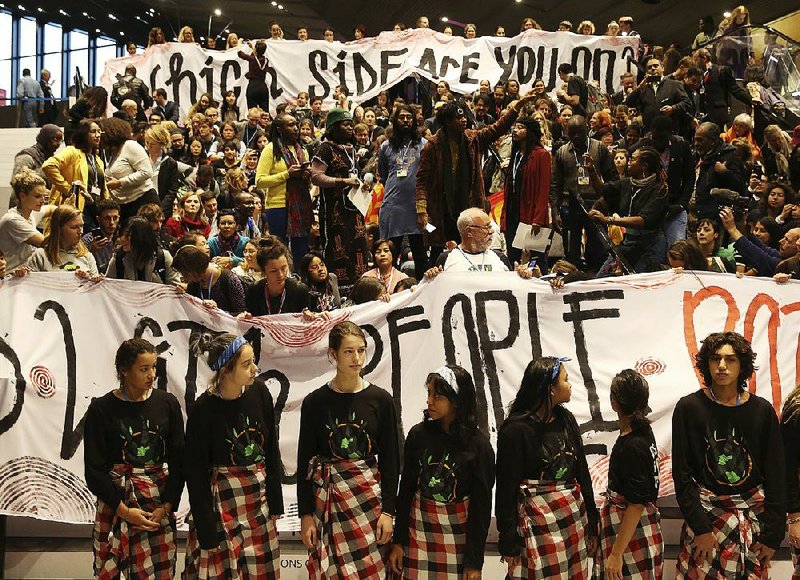KATOWICE, Poland -- Negotiators from nearly 200 nations drew close to a deal Friday that would nudge the world toward stronger targets for reducing carbon emissions and enshrine a clearer set of rules for how to get there.
But even amid the glimmers of progress at this year's climate summit, where more than 25,000 people have gathered in the heart of Poland's coal mining region, there was a deeper undercurrent of dismay. The world's best efforts, some participants concluded after two weeks of nonstop talks, would not nearly match the urgency of a problem that scientists have said will bring catastrophic consequences without major action over the next 12 years.
"Climate change is not something in our future. It's happening to us now," said Mohamed Nasheed, former president of the Maldives and chief of the island nation's negotiating team. "We will not survive if business goes as usual."
Despite the lingering questions about the world's overall resolve, Friday brought signs that the gridlock that has defined much of these talks was beginning to ease. Delegates worked through the night, scrambling to produce the latest draft of a detailed "rule book" that will serve as a road map for how countries collectively implement the 2015 Paris climate accord.
The drafts released Friday morning, which stretched hundreds of pages, showed that diplomats had apparently reached key compromises. Those included language that would recognize the importance of a recent U.N. report finding the world would need to take "unprecedented" action by 2030 to avoid the most catastrophic effects of climate change.
The report, produced by the Intergovernmental Panel on Climate Change, set an increase in temperatures of 2.7 degrees Fahrenheit above preindustrial levels as the outer limit of what the world can tolerate without cataclysmic results. The U.S. delegation -- which has been engaged in the talks, despite President Donald Trump's vow to withdraw the United States from the Paris agreement -- had blocked acceptance of the report over the weekend.
"There is no documented historic precedent" for the sweeping changes to energy, transportation and other sectors that would be necessary to hold warming below [2.7 degrees Fahrenheit], the scientists said, citing the need for a "rapid and far-reaching" transformation of human civilization.
But in Poland, the panel's findings on what the world would need to do to hold off the worst impacts of climate change collided with the reality of a bureaucratic process that requires consensus among nearly 200 nations. It was never designed to be nimble.
Instead of dramatic new commitments, diplomats were left to wrestle with what to outsiders may seem like semantics, arguing about whether to "welcome" or "note" or "recognize the role" of the report.
"You can't negotiate with the laws of physics," said Nasheed, who called the debate over how to acknowledge the report "madness."
"You can't cut a deal with science."
Even as some were frustrated Friday with the seemingly plodding approach of the international process, others noted reasons for optimism.
Laurence Tubiana, a French diplomat who presided over the 2015 Paris talks and is considered a key architect of the landmark agreement, said that if drafts of this year's deal hold together, the summit will be judged a success.
The language she had seen, she said, was "pretty much right in line with what we need to implement Paris properly."
The achievements of Katowice, she acknowledged, were highly technical in nature, with no new grand pronouncements. But that, she said, was not what was required. "Sometimes we want everything to be a big splash," she said. "But that's not reality."
Before delegates could claim success, sticking points remained.
Plenty of divisions lingered Friday, the last official day of the 24th annual U.N. climate talks. Nations continued to hash out the particulars of rules governing how transparent countries will have to be in reporting their emissions, how richer nations will help finance climate action in poorer nations and how countries can hold one another compatible on their progress.
"Nobody is going to be 100 percent satisfied," Gou Haibo, a top Chinese negotiator, said early Friday afternoon. "But we hope [a compromise] can be accepted."
One central question that remained Friday was how firmly the assembled nations would signal their intent to hold true to the emissions-cutting promises in Paris -- and whether they would commit to ramp up those pledges in 2020.
The idea that countries would increase their ambition over time was a critical element of the Paris agreement. Scientists say that countries will have to triple their efforts if the world is going to stay below a 1.8 degree temperature rise. They will need five times more commitment to stay within 2.7 degrees.
Information for this article was contributed by Chris Mooney of The Washington Post.
A Section on 12/15/2018
